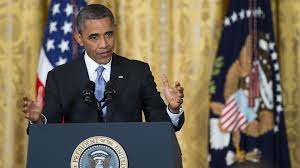For liberal internationalists, this is a bitter pill to swallow—or even to accept. “You just don’t in the 21st century behave in 19th century fashion by invading another country on completely trumped up pretext,” Secretary of State John Kerry fulminated on CBS’s Face the Nation back in March. Ah, but you do, if you happen to have a mindset more in keeping with Otto von Bismarck than Woodrow Wilson (to say nothing of Barack Obama).
This is how my good colleague, Stewart Patrick, expressed his outrage – or at least his distaste – the other day at the admittedly aggressive and deceitful behavior by everyone’s favorite bad guy right now – Vladimir Putin. As Patrick describes Russia’s actions in his recent blog post “Russia Assaults Ukraine—and the Liberal World Order”:
Russia’s intervention in Ukraine, however disingenuously denied and creatively concealed, constitutes a frontal assault on the liberal international order that the United States and its Western allies have done so much to promote and build.
The answer here is ‘yes and no’. There is no question that Russia has, as suggested, by Patrick breached several possible norms including “principles of sovereignty” and the “sanctity of borders”. Far more questionable is his suggestion that governing norms in liberal internationalism include “illegitimacy of spheres of influence” or supremacy of citizenship over ethnicity”. And even with respect to the first two norms – and this is no excuse for current Russian action – others have been all too willing to breach these norms – remember Iraq in 2003.
Further criticism of President Obama was raised over his remarks at a press conference, when he suggested “We don’t have a strategy yet.” – though Administration officials clarified that this comment was only in reference to US actions in Syria, not more generally. It is one of those kind of comments, though it may be true, it is a truth that can not be spoken. But it points us in the right direction – US leadership.
The point is that the US leadership is still ‘at sea’ when it comes exercising leadership in the current multilateral environment. It was ‘easy’ when the US exercised hegemonic leadership in great power relations – that is during the Cold War at least with its allies and after the Cold War with a growing community of great powers. That is past but surely the notion that geopolitics was abolished was a fanciful dream.
Now Patrick exhibits some of the confusion surrounding multilateralism. He suggests that Putin is acting like Bismarck and then references the Concert of Europe. First the Concert of Europe was largely dissipated when Bismarck came on the scene. Next I assume Patrick is referencing Bismarck’s aggressive steps to create the new Germany – using war with Denmark over Schleswig-Holstein (1864), Austria (1866) and finally France (1870) to create Germany. But in the context of multilateralism this behavior is succeeded by his concert efforts that for the most part managed great power relations for several decades from 1871 to his dismissal as Chancellor in 1890.
No one is likely to suggest that the actions of Russia don’t challenge multilateral relations in the contemporary setting but for some time I have suggested that the real question is one of United States leadership, not so much a challenge to liberal internationalism. How does was conduct great power relations with bouts of rivalry by others – Russia but also as he points out China in Asia – while still working collaboratively over a host of global and regional issues. It is not just I declare and you follow, or at least acquiesce. Nor is ‘leading from behind’ whatever that was. As I pointed out several years ago in “Not Required to Choose” – A Strategy for US-China Relations (April 3, 2011), it requires a deft balancing – this a la Bismarck in fact. Turning to him and one of his notable commentators, Henry Kissinger :
The genius of Bismarck was to hold opposites together. I am not thinking here of his revolutionary early career, forging a Germany – beating both Austria and France in quick but decisive conflicts – but in his diplomatic legerdemain in generating alliances with Germany at the center and antagonists especially Austria-Hungary and Russia circling around this new and newly created European “heavy weight”.
Now Patrick does see the need for deft US leadership – he talks of the US need to compartmentalize great power relations, as he says:
…castigating and standing up to thugs on some occasions (as when they invade sovereign nations), while collaborating with them where necessary (on Iran’s nuclear program, for instance).
It is very complex diplomacy and there are grave questions whether the US is even capable of ‘holding opposites’. US Presidents have not been notable for this degree of nuance when it comes to dealing with other great powers and certainly Congress and the commentariat seem even less capable of doing so. But it clear that it is US leadership in a multilateral environment that is being challenged.
Image Credit: abcnews.go.com


